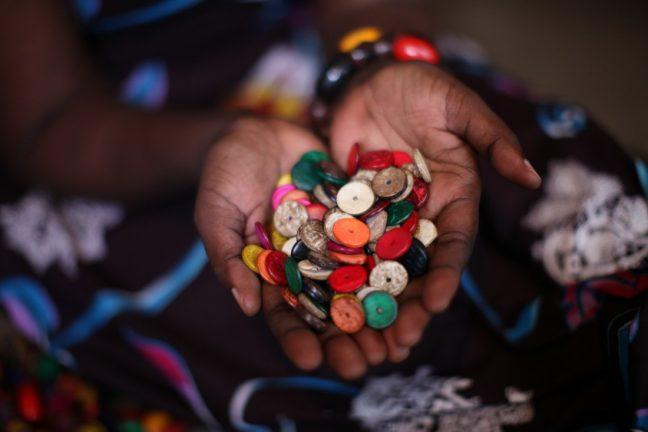Wendy Baumann, president and chief visionary officer of the Wisconsin Women’s Business Initiative Corporation, had her eye on Kiva for a long time.
The nonprofit organization was making waves in developing countries by helping to alleviate poverty and grow small businesses by way of crowdsourced loans to entrepreneurs. When it piloted in the U.S. in 2011 with locations on both coasts, Baumann was convinced.
“This is amazing, we need to get Kiva in Wisconsin,” Baumann said.
According to the Kiva website, the nonprofit is currently based in 81 countries, and helps 3.1 million borrowers around the world build small businesses, attend school and access clean energy.
The loan process is simple. As explained on the website, a zero percent interest loan is first posted to Kiva for lenders to support. Then the fundraising period begins, where lenders crowdfund the loan in increments of $25 or more, until the fundraising is complete. When the borrower can, they repay the loans, and the lenders use the repayments to fund new loans, donate or withdraw their money. The nonprofit boasts a 96.9 percent loan repayment rate, and $1.25 billion has been funded through Kiva thus far.
Wisconsin was not originally on Kiva’s list of locations to pilot the program in the U.S. But Baumann, with WWBIC’s support, persevered. She convinced Jonny Price, director of the Kiva U.S. pilot project, to make Milwaukee a Kiva City if sufficient money was raised. He agreed, and $25,000 later, Milwaukee became the eleventh Kiva City in the U.S., helping entrepreneurs access the financing needed to grow their businesses.
Following the success in Milwaukee and worldwide, Baumann said she was contacted by other cities wanting to get involved and become Kiva Cities themselves.
“We thought Madison would be ideal,” Baumann said, pointing to its “culture and what it’s all about.”
Baumann said Madison’s potential for Kiva City status quickly gained support, and Mayor Paul Soglin added $150,000 over the next three years to jumpstart the Kiva City program.
Bringing the nonprofit to Madison was a collaborative effort, achieved with support from WWBIC, Madison Gas and Electric and the Doyenne Group.
Pam Christenson, MGE’s economic development director, explained that partnering with Kiva was an obvious choice. The utility company, she said, is nicknamed “your community energy company,” with roots in Madison dating back more than 150 years. Besides providing electricity to 151,000 customers in Dane County, MGE said its also passionate about encouraging and supporting local businesses to boost and create a diverse economy.
“We get involved in things that help the community,” Christenson said. “Doing so can take on a lot of different shapes. Kiva, for example, is a way to help startup companies and help individuals and aspiring entrepreneurs.”
Aspiring women entrepreneurs, to be exact. According to their website, while Kiva financing is available to anyone and everyone, 81 percent of the loans go to women.
Christenson said it’s particularly important to support women in their business ventures.
“Women entrepreneurs and people of color are often excluded from funding,” Christenson said. “They also receive a very small percentage of funding from venture capitalists. But when women start businesses, they are very good at it.”
Andrea Hughes, project director at WWBIC, said women do not always have the necessary resources or training to start a business. Furthermore, venture capitalists, who are predominantly male, do not always understand or appreciate the products that women entrepreneurs produce.
According to the Kiva website, 46 percent of men around the world have access to financial services, but only 27 percent of women can say the same.
Christenson, however, believes Kiva has the ability to move the needle for women entrepreneurs. The Kiva lending process, she said, is geared toward strong character rather than strong credit, which she hopes will allow the business sector comprised of women entrepreneurs to grow.
“Wisconsin also ranks low in entrepreneurs,” Christenson said. “Which is another reason we are behind this — to change those metrics.”
In partnering with Kiva, Hughes said WWBIC’s main goal is to assist people in building their dreams, and providing them the stepping stones needed to help them grow. According to their website, WWBIC, a statewide economic development corporation, has been providing individuals with loans, resources and opportunities to start, strengthen or expand their businesses since 1987.
Christenson said MGE views Kiva as a new tool and opportunity for the Madison community to perpetuate economic growth. These loans change lives, and have the potential to truly make a difference in the Madison community, she said.
Since coordinating a team of trusted partners, advancing a plan and funding the initial startup for Kiva Greater Madison, Baumann was pleased to announce the nonprofit will launch in Madison Feb. 4.
“It’s going to be a really big deal, and I’m really happy we are making Madison a Kiva City,” Baumann said.


